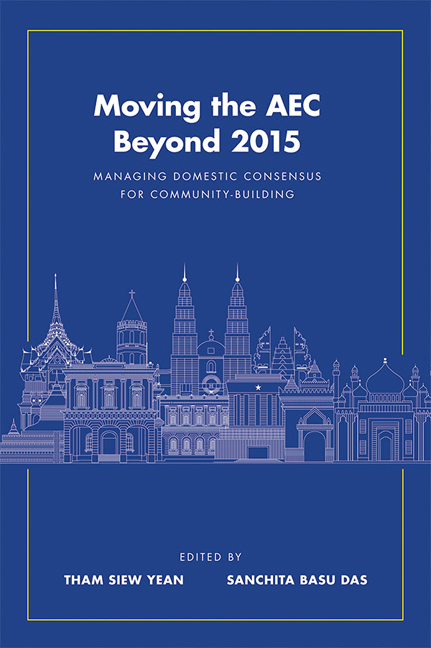Book contents
- Frontmatter
- Contents
- Foreword
- Preface
- Acknowledgements
- Abbreviations
- About the Contributors
- 1 Introduction: Economic Interests and the ASEAN Economic Community
- 2 ASEAN Economic Cooperation and Its Political Realities
- 3 Indonesia's Implementation of Facilitation and Harmonization Measures under the AEC
- 4 The AEC and Domestic Challenges in Malaysia: Examining the Liberalization of Services in AFAS
- 5 The Philippines and the AEC Beyond 2015: Managing Domestic Challenges
- 6 The AEC Beyond 2015: Implementation and Challenges for Singapore
- 7 Moving the AEC Beyond 2015: Managing Domestic Economic Interests in Thailand
- 8 Managing Domestic Consensus for ASEAN Community Building in Vietnam
- Index
1 - Introduction: Economic Interests and the ASEAN Economic Community
Published online by Cambridge University Press: 06 January 2018
- Frontmatter
- Contents
- Foreword
- Preface
- Acknowledgements
- Abbreviations
- About the Contributors
- 1 Introduction: Economic Interests and the ASEAN Economic Community
- 2 ASEAN Economic Cooperation and Its Political Realities
- 3 Indonesia's Implementation of Facilitation and Harmonization Measures under the AEC
- 4 The AEC and Domestic Challenges in Malaysia: Examining the Liberalization of Services in AFAS
- 5 The Philippines and the AEC Beyond 2015: Managing Domestic Challenges
- 6 The AEC Beyond 2015: Implementation and Challenges for Singapore
- 7 Moving the AEC Beyond 2015: Managing Domestic Economic Interests in Thailand
- 8 Managing Domestic Consensus for ASEAN Community Building in Vietnam
- Index
Summary
INTRODUCTION
The prospect of an ASEAN Economic Community (AEC) has progressively raised interest on the state of economic integration among members of the Association of Southeast Asian Nations (ASEAN). Although the Chairman's Statement from the 26th ASEAN Summit (April 2015) indicated that the current rate of implementation of the 2007 AEC Blueprint (“the Blueprint”) goals stands at 90.5 per cent (ASEAN Secretariat 2015), there are numerous studies that question the use of a scorecard approach as a monitoring mechanism. These implementation scores do not necessarily capture the actual extent of economic integration in the region. For instance, recent business surveys show that although tariffs have been reduced or eliminated among ASEAN countries, non-tariff barriers are still prevalent (Kawai and Wignaraja 2011; Hu 2013). These include nonautomatic licensing schemes, technical regulations, benchmarked standards, administrative costs, which are attached to the use of preferential measures, and a lack of physical and institutional connectivity (ASEAN Secretariat and World Bank 2013). Similarly, ASEAN citizens can hardly attribute the rise in incomes or better job opportunities to the AEC initiatives (Chia 2011a). These caveats suggest that not all of the AEC targets can be achieved by the end of 2015. This deadline may well mark a milestone rather than the complete achievement of intended goals.
How then do we interpret the disparity between stated intentions, goals and targets of the AEC and its current state of achievements and implementation? The literature frequently attributes the lack of effective progress in ASEAN economic integration to a lack of political will. One possible explanation for the lack of political will is the fact that deep regional economic cooperation faces domestic opposition arising from various economic conflicts. For example, after the Treaty of Rome was signed, it took the European Economic Community nearly forty years to achieve its objective of a single market. The stalling Doha Development Agenda can also be attributed to domestic resistance and hostility from protectionist groups in participating economies that prevent member countries from achieving the required single undertaking rule. Likewise, for ASEAN, even though the AEC is a regional initiative, implementation is left to the individual member economies. Thus, regional cooperation might have to overcome domestic antagonism. In other words, while ASEAN's economic integration is a response by the region's respective governments to globalization, it may not be supported by some domestic interest groups.
- Type
- Chapter
- Information
- Moving the AEC Beyond 2015Managing Domestic Consensus for Community-Building, pp. 1 - 23Publisher: ISEAS–Yusof Ishak InstitutePrint publication year: 2016



